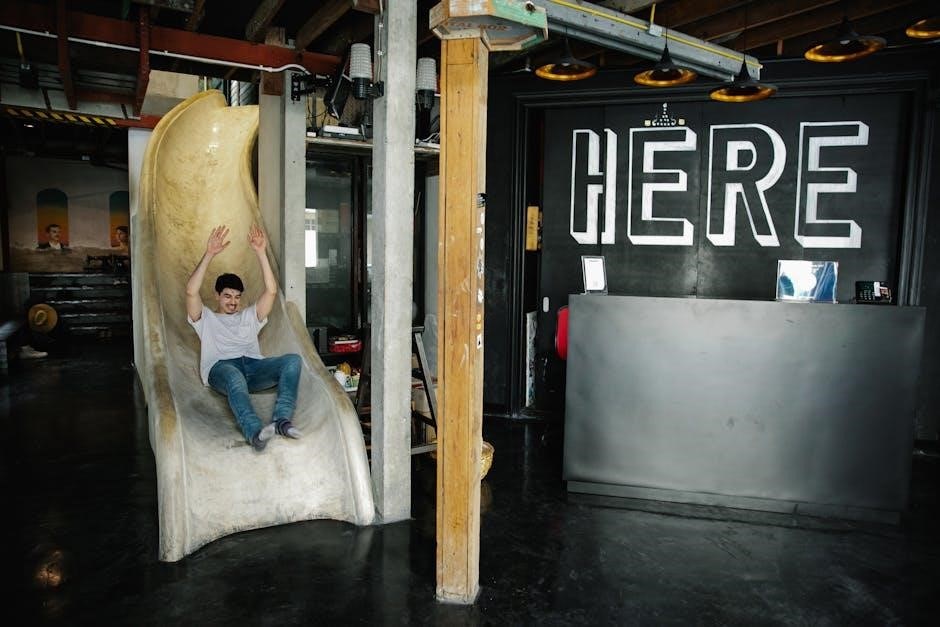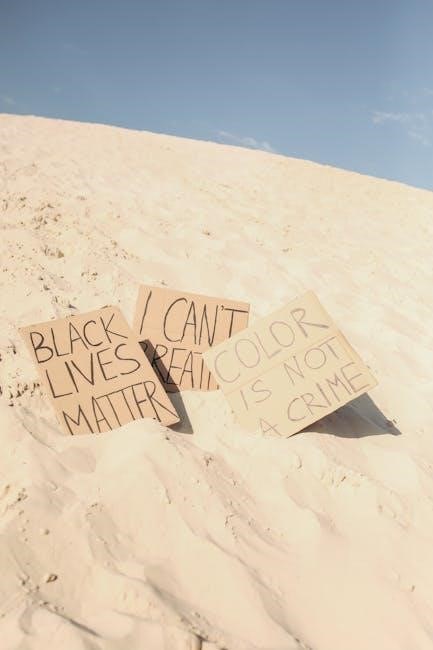It Can’t Happen Here is a 1935 dystopian novel by Sinclair Lewis‚ exploring the rise of fascism in America through the story of Buzz Windrip’s dictatorship and Doremus Jessup’s resistance. The novel is a chilling satire that remains relevant today‚ offering insights into political manipulation and societal complacency. Available as a free PDF due to its public domain status‚ it continues to resonate with readers concerned about democratic erosion and authoritarianism.
1.1. Overview of the Novel
It Can’t Happen Here‚ written by Sinclair Lewis in 1935‚ is a dystopian political satire that explores the rise of fascism in America. The novel follows Buzz Windrip‚ a charismatic dictator‚ and Doremus Jessup‚ a resisting newspaper editor‚ set against a backdrop of societal upheaval and political manipulation. Available as a PDF‚ it remains a timeless cautionary tale about authoritarianism and democratic decline.
1.2. Publication and Historical Context
It Can’t Happen Here was published in 1935 by Doubleday‚ Doran & Co.‚ during the Great Depression and the rise of fascism in Europe. This context influenced Sinclair Lewis’s portrayal of a fictional American dictatorship‚ mirroring global political tensions and societal fears of the time‚ making the novel eerily prescient and thought-provoking.
1.3. Main Themes and Relevance
The novel explores themes of totalitarianism‚ media manipulation‚ and the erosion of individual freedoms. Its relevance endures as it warns against the dangers of populism and authoritarianism‚ making it a timeless cautionary tale for modern societies grappling with similar political challenges and threats to democracy.

Historical Background and Inspiration
Sinclair Lewis drew inspiration from the rise of fascism in Europe and the political climate of the Great Depression‚ crafting a chilling narrative that mirrored the era’s anxieties and societal tensions.

2.1. The Rise of Fascism in Europe

The novel mirrors the rise of European fascism‚ particularly Hitler’s ascent‚ influencing Lewis’s portrayal of Buzz Windrip’s authoritarian regime. The political unrest and propaganda tactics of 1930s Europe shaped the story’s warning about democratic vulnerability and the dangers of complacency.
2.2. Sinclair Lewis’s Political Views
Sinclair Lewis’s political views were sharply critical of authoritarianism and nationalism. His novel reflects a deep concern about fascism’s rise and its potential impact on American democracy. Lewis used satire to warn against complacency‚ highlighting the dangers of populist rhetoric and the erosion of civil liberties.
2.3. The Great Depression and Its Impact on America
The Great Depression created widespread economic hardship‚ fostering desperation and frustration among Americans. This environment made the populace vulnerable to populist rhetoric‚ as depicted in the novel through Buzz Windrip’s rise to power. The crisis underscored societal instability‚ influencing Lewis’s portrayal of a fragile democracy susceptible to authoritarianism.

Plot Summary and Key Characters
The novel follows Berzelius “Buzz” Windrip‚ a charismatic politician who rises to dictatorship‚ and Doremus Jessup‚ a resistant newspaper editor‚ exploring the clash between fascism and freedom in America.
3.1. Berzelius “Buzz” Windrip: The American Dictator
Berzelius “Buzz” Windrip‚ a demagogic politician‚ rises to power by exploiting economic hardships and nationalist sentiments. His regime dismantles democratic institutions‚ imposing totalitarian control; Windrip’s character mirrors historical dictators‚ serving as a cautionary figure about authoritarianism’s dangers in a supposedly immune America.
3.2. Doremus Jessup: The Voice of Resistance
Doremus Jessup‚ a principled newspaper editor‚ becomes a vocal opponent of Windrip’s regime‚ symbolizing the struggle for truth and freedom. His resistance reflects the moral courage needed to challenge authoritarianism‚ embodying the spirit of dissent in the face of oppressive governance.
3.3. The Transformation of America in the Novel
The novel portrays America’s descent into authoritarianism under Buzz Windrip’s regime‚ highlighting the erosion of democracy‚ suppression of dissent‚ and manipulation of media. The transformation mirrors historical fascist rises‚ offering a stark warning about the fragility of civil liberties and the dangers of unchecked power.

Themes and Symbolism

It Can’t Happen Here explores themes of authoritarianism‚ media manipulation‚ and the erosion of individual freedoms. The novel symbolizes the fragility of democracy and the dangers of complacency‚ offering a timeless warning about the rise of populist regimes.
4.1. The Danger of Populism and Nationalism
The novel underscores the perils of populism and nationalism through Buzz Windrip’s meteoric rise‚ exploiting economic and social anxieties. His rhetoric of unity and patriotism masks authoritarian intentions‚ highlighting how demagogues manipulate fear to erode civil liberties and democratic norms‚ offering a timeless warning about the fragility of democracy.
4.2. The Role of Media in Shaping Public Opinion
It Can’t Happen Here critiques how media manipulation shapes public perception. Buzz Windrip’s regime uses propaganda and censorship to control narratives‚ while Doremus Jessup’s resistance highlights the power of independent journalism. The novel illustrates how media can either uphold democracy or undermine it‚ reflecting timeless concerns about misinformation and press freedom.
4.3. The Struggle for Individual Freedom
It Can’t Happen Here portrays the erosion of personal liberties under a totalitarian regime. Doremus Jessup’s defiance against Windrip’s dictatorship symbolizes the fight for individual freedom. The novel underscores the fragility of democracy and the importance of dissent‚ warning against complacency and the loss of civil rights in the face of authoritarianism.
Comparisons with Real Historical Events
It Can’t Happen Here mirrors the rise of fascism in 1930s Europe‚ drawing parallels with Hitler’s regime. The novel serves as a cautionary tale about authoritarianism and democratic collapse‚ resonating with historical events that shaped the 20th century.
5.1. Parallels with Adolf Hitler’s Rise to Power
It Can’t Happen Here draws eerie parallels with Hitler’s ascent‚ as Buzz Windrip exploits economic turmoil and nationalist sentiment to seize power. Both leaders use propaganda‚ scapegoating‚ and authoritarian tactics‚ highlighting the novel’s warning about the fragility of democracy and the dangers of unchecked populism.
5.2. The Novel’s Predictions and Modern Relevance
It Can’t Happen Here eerily predicts the erosion of democracy‚ authoritarianism‚ and media manipulation. Its themes of populist rhetoric‚ societal division‚ and the exploitation of fear resonate strongly today‚ making it a chillingly relevant cautionary tale about the fragility of democratic systems in modern times.

5.3. The Novel’s Warning About Democratic Erosion
It Can’t Happen Here serves as a stark warning about the gradual erosion of democratic institutions. Lewis depicts how authoritarianism can emerge through democratic processes‚ highlighting the dangers of complacency and the exploitation of fear‚ offering a timely reminder of democracy’s fragility and the need for vigilance.
Reception and Legacy
It Can’t Happen Here was a 1935 bestseller‚ sparking debates on fascism’s rise. Its 2016 revival highlighted its enduring relevance‚ cementing its influence on political discourse and literary legacy as a cautionary tale.
6.1. Initial Reception in 1935
Upon its release in 1935‚ It Can’t Happen Here garnered significant attention‚ sparking debates about fascism’s potential rise in America. Critics praised its timely satire and bold commentary‚ while others found its premise unsettling yet thought-provoking. The novel became a bestseller‚ resonating with a nation grappling with economic and political turmoil during the Great Depression.
6.2. Revivals and Adaptations
It Can’t Happen Here has seen notable revivals‚ including the 1936 Federal Theater Production and the 2016 Berkeley Repertory Theatre adaptation; Directed by Lisa Peterson‚ the 2016 production emphasized ensemble performance‚ with actors playing multiple roles‚ highlighting the novel’s enduring relevance and adaptability for contemporary audiences.
6.3. The Novel’s Impact on Political Discourse
It Can’t Happen Here has significantly influenced political discourse‚ serving as a warning against fascism and authoritarianism. Its depiction of a dictator’s rise resonates in discussions about democratic erosion‚ making it a timeless cautionary tale relevant to modern political debates and societal concerns about freedom and power.
Availability in PDF and Digital Formats
It Can’t Happen Here is widely available in PDF and EPUB formats‚ downloadable from platforms like Project Gutenberg and Google Books‚ due to its public domain status in many countries.
7.1. Downloading the Novel Legally
It Can’t Happen Here is in the public domain in many countries‚ allowing free PDF downloads from platforms like Project Gutenberg‚ Google Books‚ and the Internet Archive. Ensure compliance with local copyright laws when accessing or sharing the novel digitally.
7.2. Public Domain Status and Access
It Can’t Happen Here entered the public domain in many countries due to its 1935 publication and the author’s death in 1951. This status allows free access to PDF versions‚ making the novel widely available for download and reading without copyright restrictions.
7.3. Popular Platforms for Download
It Can’t Happen Here is available on platforms like Archive.org‚ Project Gutenberg‚ and ManyBooks. These sites offer free PDF downloads‚ ensuring easy access to Sinclair Lewis’s timeless novel for readers worldwide.
Theatrical Adaptations
It Can’t Happen Here has been adapted into plays‚ notably the 1936 Federal Theater Production and the 2016 Berkeley Repertory Theatre revival‚ highlighting its enduring relevance through ensemble performances.
8.1. The 1936 Federal Theater Production
The 1936 Federal Theater Production of It Can’t Happen Here was a groundbreaking adaptation‚ commissioned by Berkeley Repertory Theatre‚ directed by Lisa Peterson‚ with scenic design by Rachel Hauck. It showcased the rise of Buzz Windrip and featured an ensemble cast performing multiple roles‚ highlighting the novel’s political urgency and relevance.
8.2. The 2016 Berkeley Repertory Theatre Revival
The 2016 revival by Berkeley Repertory Theatre adapted Sinclair Lewis’s novel into a compelling stage production. Directed by Lisa Peterson‚ it featured a minimalist set and ensemble performances‚ emphasizing the timeless relevance of fascism’s threat to democracy. The play resonated sharply with contemporary political climates‚ drawing parallels to modern leadership.
8.3. Ensemble Performance and Multiple Roles
The 2016 adaptation featured an ensemble of 12-14 actors‚ each playing multiple roles to depict the story’s breadth. This dynamic approach emphasized the universality of the characters’ struggles‚ blending individual narratives into a collective commentary on fascism and democratic erosion‚ mirroring the novel’s themes of societal transformation.

Relevance in Contemporary Society
It Can’t Happen Here remains eerily relevant‚ warning against authoritarianism‚ nationalism‚ and media manipulation. Its themes of democratic erosion and populist rise resonate strongly in today’s political climate‚ urging vigilance and reflection.
9.1. The Novel’s Warning About Modern Politics
It Can’t Happen Here serves as a cautionary tale‚ highlighting the dangers of unchecked populism and authoritarianism. Its depiction of a charismatic leader exploiting fear and divisiveness mirrors contemporary political trends‚ offering a stark reminder of democracy’s fragility and the importance of vigilance against erosion of civil liberties and truth distortion.
9.2. Comparisons with Contemporary Leaders
The novel’s portrayal of Buzz Windrip’s rise mirrors contemporary leaders who exploit fear‚ nationalism‚ and populism. Like Windrip‚ some modern leaders use divisive rhetoric‚ promising to restore past glory while undermining democratic institutions‚ echoing the dangers of authoritarianism and the erosion of civil liberties depicted in the novel.
9.3. The Novel’s Message for Today’s Readers
Sinclair Lewis’s It Can’t Happen Here serves as a timeless warning about complacency and the dangers of unchecked authoritarianism. Its themes of propaganda‚ manipulation‚ and the erosion of civil liberties resonate deeply today‚ urging readers to remain vigilant and actively defend democratic values in an increasingly polarized world.

Critical Analysis and Reviews
Scholars hail Sinclair Lewis’s It Can’t Happen Here as a prophetic warning against authoritarianism‚ blending satire with sharp societal critique‚ ensuring its relevance in modern political discourse.
10.1. Scholarly Perspectives on the Novel
Scholars widely regard It Can’t Happen Here as a prophetic critique of authoritarianism‚ blending satire with biting social commentary. Its exploration of fascism’s rise in America resonates deeply‚ making it a pivotal work in American literary and political discourse‚ while its PDF availability ensures ongoing academic and public engagement.
10.2. Comparisons with Other Dystopian Works
It Can’t Happen Here is often compared to classics like 1984 and The Handmaid’s Tale‚ yet it uniquely satirizes fascism’s rise in an American context. Its blend of humor and horror sets it apart‚ offering a stark warning about democracy’s fragility‚ while its PDF availability makes it accessible for modern readers to draw parallels with contemporary dystopian themes.
10.3. The Novel’s Place in American Literature
It Can’t Happen Here holds a significant place in American literature as a pioneering dystopian novel. Sinclair Lewis’s sharp critique of fascism and nationalism resonates deeply‚ making it a landmark work that bridges satire and political commentary‚ ensuring its relevance alongside other classics in the genre‚ now easily accessible as a PDF.
It Can’t Happen Here remains a timeless cautionary tale‚ warning against fascism’s rise and democratic erosion. Its relevance endures‚ offering a mirror to modern politics and societal vulnerabilities‚ now widely accessible as a free PDF.
11.1. The Enduring Importance of “It Can’t Happen Here”
It Can’t Happen Here remains a vital warning about fascism’s insidious rise‚ resonating with its portrayal of authoritarianism and societal complacency. Its themes of democratic erosion and resistance are timeless‚ making it a critical read in understanding political manipulation and the fragility of freedom‚ now accessible to all as a free PDF.
11.2. Lessons for the Future
It Can’t Happen Here offers crucial lessons about complacency and authoritarianism‚ urging vigilance against manipulation. Its exploration of democratic erosion and resistance remains a vital guide‚ emphasizing the importance of active citizenship and critical thinking to prevent future dictatorships‚ now accessible to all in PDF form.
11.3. Final Thoughts on the Novel’s Impact
It Can’t Happen Here remains a timeless warning‚ offering profound insights into democracy’s fragility. Its exploration of authoritarianism and resistance continues to resonate‚ making it a vital read in today’s political climate. As a public domain work‚ its PDF availability ensures its message reaches future generations‚ fostering critical reflection and civic engagement;
